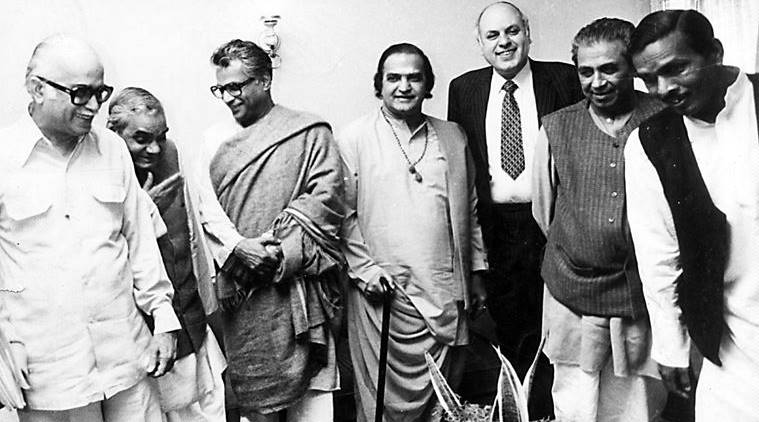 With LK Advani, George Fernandes, NT Rama Rao and Farooq Abdullah. (File)
With LK Advani, George Fernandes, NT Rama Rao and Farooq Abdullah. (File)
AT 5.30 pm on July 6, 2000, Prime Minister Atal Bihari Vajpayee entered Railway Minister Mamata Banerjee’s semi-pucca house at Harish Chatterjee Street in Kolkata. He greeted Banerjee and touched her mother, Gayatri Devi’s feet, who gave him a pink rose and a silk scarf. Conch shells blew and cries of adulation echoed in the narrow lane from Banerjee’s supporters.
Eighteen years later, the story continues to be told and re-told in Bengal when the topic of federalism is discussed. In the days preceding this 20-minute meeting, which Banerjee had described as “personal” at the time, the relationship between the Railway Minister and the NDA government had been strained. Banerjee had opposed the NDA government’s decision to shut down some ‘sick’ public sector units (PSUs) in Bengal.
“When the matter was raised in the cabinet, the Prime Minister told Banerjee that the issue would be ‘kept in abeyance’, allowing some time to discuss the issue further. The meeting at her house cemented the relationship and gave the signal that Banerjee was a valued member of the alliance,” said a former aide of Vajpayee. Those who worked closely with Vajpayee during his tenure as Prime Minister each have such stories.
In July 1999, Pramod Mahajan, a close associate of Vajpayee, had come to Kolkata and attended the martyr day rally. At the time, Mamata Banerjee was supporting the Vajpayee government from outside and had been exerting pressure on the Centre, demanding a special package for West Bengal. She had threatened to withdraw support.
“Vajpayee was alarmed and he sent Pramod Mahajan… He (Mahajan) went to the rally and announced that Vajpayee had accepted all demands of the Trinamool Congress chief… this move allowed the relationship to flourish,” added a retired West Bengal-cadre IAS officer.
Another aide said, “There were two other occasions that I remember where Vajpayee actively spoke to his own party to ensure that alliance partners don’t get too angry. One involved DMK chief M Karunanidhi. There were strained ties for nearly two years before Karunanidhi eventually pulled out of the alliance in 2003. One of the reasons was the POTA issue, which DMK claimed was being misused. He spoke to other senior leaders in the party about it. The other issue was when a section of dissident BJD leaders were being courted by the BJP. At the time, Naveen Patnaik was the union steel minister. Patnaik got wind of this and spoke to Vajpayee, who in turn brought an end to the matter.”